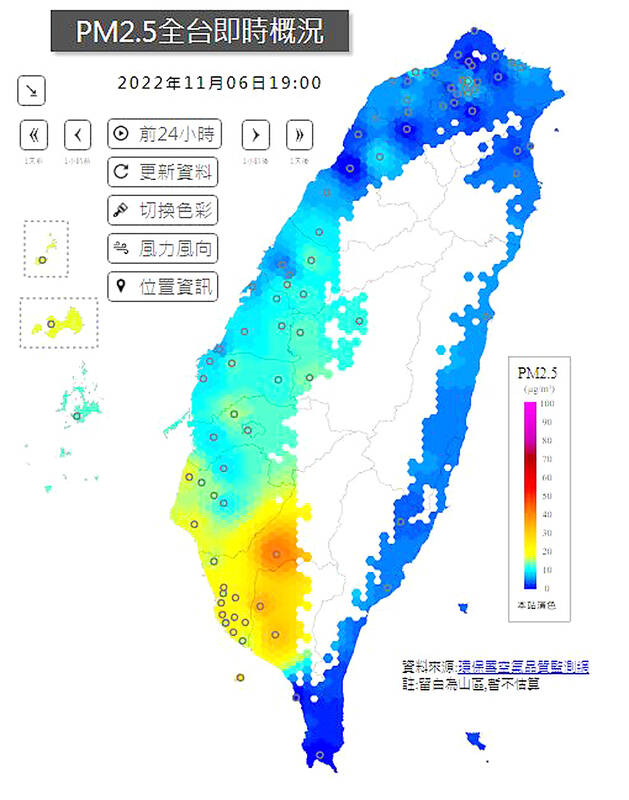People should avoid vigorous outdoor exercise and use air purifiers indoors during peak PM2.5 pollution, as breathing polluted air could lead to liver and kidney injury in the long term, experts said, citing studies.
Yuan Chung-shin (袁中新), a distinguished professor and director at National Sun Yat-sen University’s Institute of Environmental Engineering, and Cheng Fu-jen (鄭富仁), a doctor at Kaohsiung Chang Gung Memorial Hospital’s Department of Emergency Medicine, have published their findings in the journals Science of the Total Environment and Ecotoxicology and Environmental Safety.
A research team led by Yuan and Cheng collected airborne particulate matter smaller than 2.5 micrometers (PM2.5) near Kaohsiung’s Linhai Industrial Park (臨海工業區) to study the effects of PM2.5 constituents on the livers and kidneys of laboratory mice.

Photo: Screen grab from the Environmental Protection Administration Web site
Studies have shown that PM2.5, which is listed by WHO as a Group 1 carcinogen, could harm the lungs and heart.
The team separated PM2.5 into water extracts and insoluble particles, to which mice were exposed by intratracheal instillation.
Exposure to water extracts and insoluble particles led to abnormal liver function and kidney injury, Cheng said.
Insoluble particles caused inflammation in the liver, while water extracts induced cellular proliferation, which showed that different components of PM2.5 pose different health risks to the organ that removes toxins from the blood, he said.
Water extracts and insoluble particles both caused inflammation and injury in the kidneys, he said, adding that PM2.5 might impair kidney function, which could lead to high blood pressure and constricted blood vessels.
The mice were exposed to 40 micrograms of pollutants per week, similar to what they would have inhaled in Kaohsiung during winter, Yuan said.
It was challenging to collect particulate matter, as the team had to take into consideration the wind direction and the matter’s concentration in the air, which is higher in spring and winter, but lower in summer and fall, he said.
It took four sampling machines operating continuously for a month to collect 30,000 micrograms of PM2.5 for the experiment, he added.
Water extracts of PM2.5 mainly include titanium, vanadium, nickel, lead, sulfate and nitrate, while insoluble particles mainly include organic carbons, elemental carbons, heavy metals and other chemicals, he said.
“We might inhale some of the toxic elements while breathing,” he added.
PM2.5 could cause acute asthma attacks and aggravate chronic obstructive pulmonary disease, he said, adding that long-term exposure could increase the risks of lung cancer, and kidney and liver injury through the circulatory system.

Taipei, New Taipei City, Keelung and Taoyuan would issue a decision at 8pm on whether to cancel work and school tomorrow due to forecasted heavy rain, Keelung Mayor Hsieh Kuo-liang (謝國樑) said today. Hsieh told reporters that absent some pressing reason, the four northern cities would announce the decision jointly at 8pm. Keelung is expected to receive between 300mm and 490mm of rain in the period from 2pm today through 2pm tomorrow, Central Weather Administration data showed. Keelung City Government regulations stipulate that school and work can be canceled if rain totals in mountainous or low-elevation areas are forecast to exceed 350mm in

TRAFFIC SAFETY RULES: A positive result in a drug test would result in a two-year license suspension for the driver and vehicle, and a fine of up to NT$180,000 The Ministry of Transportation and Communications is to authorize police to conduct roadside saliva tests by the end of the year to deter people from driving while under the influence of narcotics, it said yesterday. The ministry last month unveiled a draft of amended regulations governing traffic safety rules and penalties, which included provisions empowering police to conduct mandatory saliva tests on drivers. While currently rules authorize police to use oral fluid testing kits for signs of drug use, they do not establish penalties for noncompliance or operating procedures for officers to follow, the ministry said. The proposed changes to the regulations require

EVA Airways president Sun Chia-ming (孫嘉明) and other senior executives yesterday bowed in apology over the death of a flight attendant, saying the company has begun improving its health-reporting, review and work coordination mechanisms. “We promise to handle this matter with the utmost responsibility to ensure safer and healthier working conditions for all EVA Air employees,” Sun said. The flight attendant, a woman surnamed Sun (孫), died on Friday last week of undisclosed causes shortly after returning from a work assignment in Milan, Italy, the airline said. Chinese-language media reported that the woman fell ill working on a Taipei-to-Milan flight on Sept. 22

1.4nm WAFERS: While TSMC is gearing up to expand its overseas production, it would also continue to invest in Taiwan, company chairman and CEO C.C. Wei said Taiwan Semiconductor Manufacturing Co (TSMC) has applied for permission to construct a new plant in the Central Taiwan Science Park (中部科學園區), which it would use for the production of new high-speed wafers, the National Science and Technology Council said yesterday. The council, which supervises three major science parks in Taiwan, confirmed that the Central Taiwan Science Park Bureau had received an application on Friday from TSMC, the world’s largest contract chipmaker, to commence work on the new A14 fab. A14 technology, a 1.4 nanometer (nm) process, is designed to drive artificial intelligence transformation by enabling faster computing and greater power